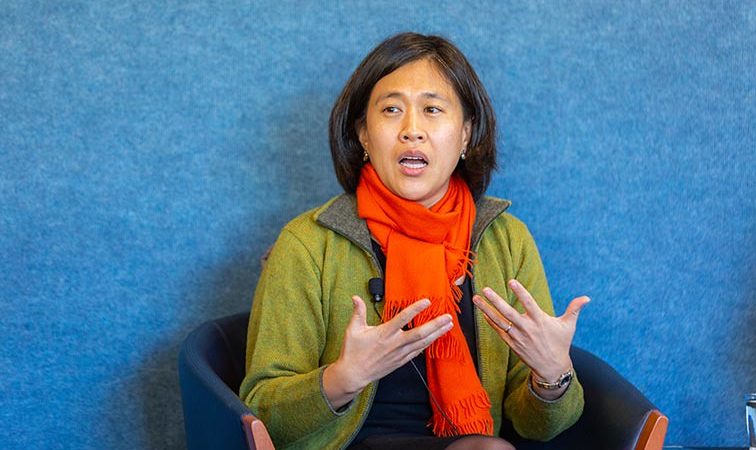Tai Dodges Concerns About TRIPS Waiver
At two congressional hearings on Wednesday and Thursday, U.S. Trade Representative Katherine Tai dodged questions from numerous members of Congress concerned about the Biden administration’s proposed Trade-Related Aspects of Intellectual Property Rights (TRIPS) waiver for COVID-19 vaccines at the World Trade Organization (WTO).
Tai was summoned to the Senate Committee on Finance on Wednesday and the House Ways & Means Committee on Thursday to provide testimony about the Biden administration’s 2021 trade policy agenda. While topics such as the U.S.-Mexico-Canada Agreement (USMCA), China’s unfair trade practices, and discriminatory digital services taxes were also covered, the hottest topic at both hearings was TRIPS.
This plan, originally proposed by India and South Africa and recently supported by the Biden administration, would strip the intellectual property rights of manufacturers of COVID-19 vaccines like Pfizer and Moderna and allow generic versions of the vaccines to be produced by anyone, anywhere in the world. Understandably, several senators and representatives had major concerns about this decision.
“I was shocked and very disturbed to see that the administration is going to be supporting waiving the intellectual property rights of American companies for COVID-19 vaccines,” Senator Pat Toomey (R-PA) told Ambassador Tai on Wednesday. “I’m aware of no evidence whatsoever that this step is going to enhance vaccine availability in developing countries. In fact, it could quite possibly be the contrary.”
As Toomey explained, allowing unregulated vaccine production to occur in countries that do not have the proper infrastructure to do so would inevitably end with ineffective or even dangerous versions of the vaccine being produced. This view concurs with the view expressed by U.S. Under Secretary of Commerce for Intellectual Property Andrei Iancu at PRA’s event celebrating World IP Day last month.
Further, without proper intellectual property rights protections, companies will be less able to produce new innovative medicines in future health emergencies, explained Representative Brad Wenstrup (R-OH). “I worry that the waiver could lead to innovators being less likely to engage in public-private partnerships which we saw with Operation Warp Speed so successfully, and that would leave us a little more exposed and unprepared for the next pandemic.”
Senator John Thune (R-SD), along with several of his other colleagues, pointed out that there are better alternatives to IP seizure: “In my view at least, what we need to address is the production capability, manufacturing, scaling that up big time rather than giving away our IP from our pharmaceutical companies and the important work that they do…to continue to come up with solutions to treat these types of pandemics when they come up.”
All in all, 19 different members of Congress expressed concern about the IP giveaway proposal to Ambassador Tai during the hearings, while few expressed any kind of support. Even Tai herself, in response to questioning by Rep. Wenstrup, eventually admitted that “a possible waiver of intellectual property protections at the WTO could lead to negative consequences or unintended consequences.”
Despite these countless glaring flaws in the TRIPS proposal, Tai continued to defend this proposed violation of IP rights, and the Biden administration has yet to change its position. The administration should immediately revoke support from this process to seize IP from American companies and instead focus its attention on the real problems with vaccine distribution, so that we can save lives both today and tomorrow.
Photo Credit: Institute of the Americas on Flickr

